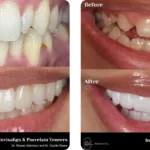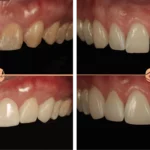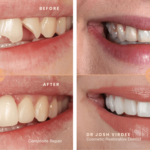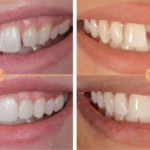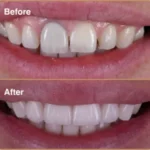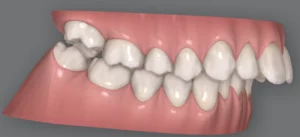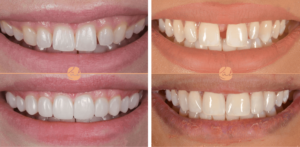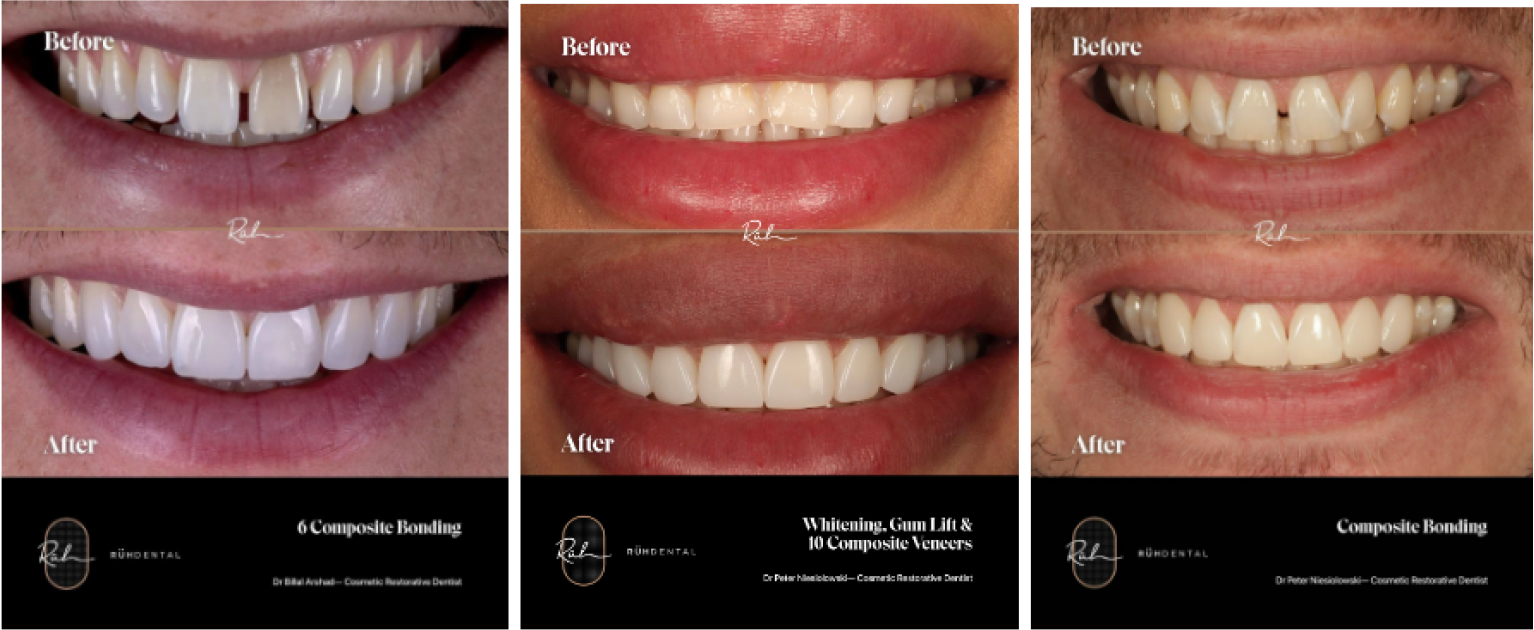
Have you ever felt self-conscious about your smile, have chipped teeth or noticed that your teeth are not as white as they used to be? You may be a great candidate for composite bonding. This minimally invasive cosmetic dental procedure can help restore the beauty and health of your smile. Let’s explore what this procedure involves and how it can benefit you.
Composite bonding is a cosmetic dental procedure where a cosmetic dentist applies a composite resin material to the surface of the teeth in order to change their size, shape or color. The material used for composite bonding is made up of microscopic glass and plastic particles that are mixed together with special adhesive materials which ensures that it is strong, durable and matches as close to natural tooth structure as possible. This material is then applied directly to the tooth and shaped into place. This process is completed free hand to enable the cosmetic dentist the artistic freedom to sculpt and shape the teeth to ensure the most natural outcome. Composite bonding can also be used to fill in small gaps between teeth or to repair chipped or cracked teeth.
Benefits of Composite Bonding
The primary benefit of composite bonding is that it offers an affordable alternative for those who want to correct minor flaws in their smiles without undergoing more expensive treatments such as porcelain veneers or crowns. Additionally, since no removal of enamel is required during the procedure, there’s minimal damage done to the teeth being treated. The entire process usually takes a morning or afternoon session and requires no anesthesia or injections, so patients can go home shortly after the treatment has been completed.
Smile Enhancement Options
| Whitening | Invisalign | Composite Bonding | Porcelain Veneers | |
|---|---|---|---|---|
| When is it used? | To enhance the colour of the teeth when they are straight with no flaws in shape or size | To straighten misaligned teeth or to correct bite problems such as underbite, overbite | To improve the size, shape and colour of teeth with minor flaws | To improve the size shape and colour of teeth with more major flaws and when Invaslign is not possible or the patient does not want it |
| Time | Results are noticeable within first days and complete in 2 weeks at home | Anywhere from 4-18 months depending on complexity of treatment requirements | One 3-4 hour appointment after initial consultation | 4-6 hours split over 2 appointments |
| Benefits | Reliable results achieved in short space of time without any dental work needing to be done | Can improve the alignment of the teeth where composite bonding and / or porcelain veneers would not be possible | Instant results in one appointment with no drilling or injections | More durable and longer lasting than composite bonding and superior aesthetics |
| Maintainence requirement | May require top up syringes every 2-5 years | Night time retainers for life | May require replacement after 5-7 years | Minimal long term maintenance compared to other options - can last up to 15 years + |
| Cost (0% finance options available) | £3-500 | £3-4500 | £3-500 per tooth | £950-1250 per tooth |
Furthermore, composite bonding offers immediate results with very little downtime compared to other cosmetic procedures. Patients can see results immediately after they leave the clinic and don’t have to wait weeks or even months before they start seeing improvements in their smiles.
Composite bonding is an effective and affordable way for anyone looking to improve their smile without undergoing more costly and invasive treatments like porcelain veneers or crowns. It’s minimally invasive, requires no anesthesia and only takes a few hours to complete in one appointment; plus it provides immediate results with no downtime.
How Long Does Composite Bonding Last?
If you’re considering composite bonding as a way to restore your teeth and improve your smile, you probably have questions about how long it will last.
On average, composite bonding can last anywhere from 5-7 years depending on several factors such as lifestyle habits (i.e., smoking), oral hygiene habits (i.e., brushing and flossing regularly), and diet (i.e., avoiding foods that stain such as red wine, turmeric etc.). With proper care and regular maintenance composite bonding can even last up to 10 years without needing any touch-ups or replacements—which makes them an attractive option for many patients who don’t want to commit to more intensive dental procedures like porcelain veneers or crowns.
Should I Get Composite Bonding?
Whether or not composite bonding is right for you depends on your specific needs and goals for improving your smile. While composite bonding may be suitable for minor repairs such as chipped teeth or gaps between teeth, more serious issues like missing teeth may require more permanent solutions like dental implants or dentures.
Composite Bonding Cost
The cost of composite bonding can vary from person to person depending on how much repair is needed and how many teeth are being bonded. Generally, however, it costs between £300-£500 per tooth. On average most patients tend to want 4-6 teeth with some even requiring more. This will be discussed with you on your consultation appointment to understand your needs and wants to give you the best outcome.
How Long Does Composite bonding Take?
The main benefit of composite bonding is that the entire process usually takes a morning or afternoon session and requires no anesthesia or injections, so patients can go home shortly after the treatment has been completed with minimal fuss or downtime
How to look after composite bonding
If you’ve had composite bonding, or are thinking about it, you may be wondering what the best way is to look after it. Here are some tips for looking after your composite bonding.
Brush twice daily. It’s important to keep your composite bonding free from plaque and tartar. To do this, make sure you brush twice daily with a soft-bristled toothbrush and fluoride toothpaste. Also, use floss or interdental brushes daily to clean between the teeth where plaque and bacteria can accumulate. This will help reduce any risks of decay or staining around the treated teeth.
Limit certain foods and drinks. Certain foods and drinks can cause staining on your composite bonding so it’s best to limit their consumption if possible. These include coffee, tea, red wine, cola drinks, highly acidic foods (e.g., citrus fruits), and food that contain dyes. If these items cannot be avoided completely then try not to let them come into contact with your composite bonding for too long as they could cause staining over time.
It’s important that you visit your dentist regularly for maintenance reviews so they can assess how well the composite bonding is holding up over time. We normally recommend at least a yearly polishing and maintenance review to bring back the shine and luster that was there on the day they were first done.
Composite Bonding and Composite veneers: What’s the Difference?
If you’re looking for a way to improve your smile, you may have heard of both composite bonding and composite veneers. But what do these terms mean? How do they differ from one another? The terms composite bonding and composite veneers are often used interchangeably but there is a very subtle difference. Composite bonding is the physical process of the resin being applied to the tooth surface, whereas composite veneers are the actual final product of the resin that is applied when it is set and polished.








